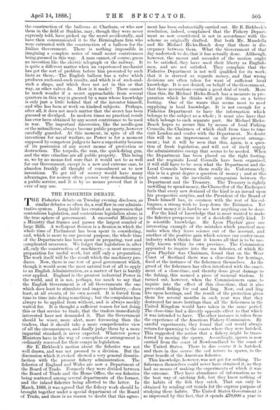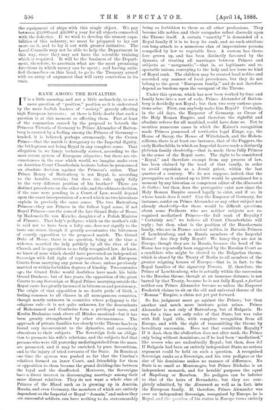THE FISHERIES DEBATE. T HE Fisheries debate on Tuesday evening discloses,
as similar debates so often do, a real flaw in our adminis- trative system. Long habit has created an impression that contentious legislation, and contentious legislation alone, is the true sphere of government. A successful Ministry is a Ministry that frames and passes the largest number of large Bills. A well-spent Session is a Session in which the whole time of Parliament has been spent in considering, and, which is more to our present purpose, the whole time of the Departments has been spent in preparing, vast and complicated measures. We forget that legislation is, after all, only the construction of machinery,—a most necessary preparation for useful work, but still only a preparation. The work itself will be the result which the machinery pro- duces. Now, there is one test of good government which, though it would seem the most natural test of all to apply to an English Administration, as a matter of fact is hardly ever applied. England is the greatest industrial Power in the world, and it is not, perhaps, too much to say that the English Government is of all Governments the one which does least to stimulate and improve industry,—does least, at all events, of its own accord. It is forced from time to time into doing something ; but the compulsion has always to be applied from without, and is always meekly waited for. It is thought a sufficient reason for not doing this or that service to trade, that the traders immediately interested have not demanded it. That the Government should be wiser, more alert, more foreseeing than the traders, that it should take a more comprehensive view of all the circumstances, and finally judge them by a more impartial standard, is never expected. Whatever power Ministers have in the way of conception or arrangement is ordinarily reserved for their essays in legislation. Sir E. Birkbeck's motion about the fisheries was not well drawn, and was not pressed to a division. But the discussion which it evoked showed a very general dissatis- faction with the present fishery administration. The fisheries of England and Wales are now a Department of the Board of Trade. Formerly they were divided between the Board of Trade and the Home Office, the sea fisheries being scattered among several departments of the former, and the inland fisheries being allotted to the latter. In March, 1886, it was agreed that the fishery work should be brought together under a special department of the Board of Trade, and there is no reason to doubt that this agree- ment has been substantially carried out. Sir E. Birkbeck's resolution, indeed, complained that the Fishery Depart- ment as now constituted is not in accordance with the scheme as originally drafted. But both Mr. Mundella. and Sir Michael Hicks-Beach deny that there is dis- crepancy between them. What the Government of that day undertook to do, that it has actually done. Although. however, the mover and seconder of the motion ought to be satisfied, they have used their liberty as English- men, and are not satisfied. They complain that the Fisheries Department is not well qualified for its work, that it is starved as regards money, and that wrong decisions are often taken for want of sufficient local knowledge. It is not denied, on behalf of the Government, that these accusations contain a good deal of truth. More than this, Sir Michael Hicks-Beach has a measure in pre- paration which he thinks will put things on a better footing. One of the wants that seems most to need supplying is local knowledge. It is not enough for a Fisheries Department to have the information which belongs to the subject as a whole ; it must also have that which belongs to each separate part. Sir Michael Hicks- Beach hopes to secure this by means of local Fishing Councils, the Chairmen of which shall from time to time visit London and confer with the Department. No doubt this will be au improvement on the present arrange- ment ; but it will be seen that this, again, is a ques- tion of fresh legislation, and will not of itself supply the administrative energy that seems to be needed. When the Department has been placed on the right footing, and the requisite Local Councils have been organised, it will still have to be seen what the Department and the Local Councils between them really do. Unfortunately, this is in a great degree a question of money ; and at this point comes in the inevitable antagonism between the Department and the Treasury. The Treasury is rightly unwilling to spend money, the Chancellor of the Exchequer feels that every new demand of the kind is an inroad upon his prospective surplus, and the President of the Board of Trade himself has, in common with the rest of his col- leagues, a strong wish to keep down the Estimates. Yet without money it is hard to see how anything can be done. For the kind of knowledge that is most wanted to make the fisheries prosperous is of a decidedly costly kind. It is scientific knowledge. Sir Lyon Playfair gave one interesting example of the mistakes which practical men make when they leave science out of the account, and another of the positive gain which science can confer on an industry which thinks that it knows all that is to be use- fully known within its own province. The Commission appointed to inquire into the sea fisheries, of which Sir Lyon Playfair was Chairman, found that on the West.
Coast of Scotland there was a close-time for herrings, fixed at the instance of the fishermen themselves. As the greed of the fishermen has often interfered with the enact- ment of a close-time, and thereby done great damage to the fishing, this seemed a piece of unusual wisdom. It turned out, however, when the Commissioners came to inquire into the effect of this close-time, that it also prevented fishing for cod and ling. Now, cod and ling live upon herrings, and the result of the protection given them for several months in each year was that they destroyed far more herrings than all the fishermen in the United Kingdom would have taken in the same period. The close-time had a directly opposite effect to that which it was intended to have. The other instance is taken from the experience of the American Fishery Commission. By careful experiments, they found that cod would always return for spawning to the coasts where they were hatched. This suggested the notion that a fishery might be trans- ferred by moving the spawn. Accordingly, spawn is now carried from the coast of Newfoundland to the coast of the United States. There in due course it is hatched, and there in due course the cod return to spawn, to the great benefit of the American fisheries. This knowledge, however, was not got for nothing. The fishermen themselves could never have obtained it, as they had no means of making the experiments of which it was the outcome. They have abundance of information as to the best way of catching fish, but they know nothing of the habits of the fish they catch. That can only be obtained by sending out vessels for the express purpose of studying these habits. The United States Government is so impressed by this fact, that it spends £70,000 a year in the equipment of ships with this single object. We pay between £5,000 and £6,000 a year for all objects connected with the fisheries. If we wish to develop the utmost capa- bilities of this industry, we must be prepared to lay out more on it, and to lay it out with greater initiative. The Local Councils may not be able to help the Department in this way, since they may not have the scientific training which is required. It will be the business of the Depart- ment, therefore, to ascertain what are the most promising directions in which money can be spent ; and having satis- fied themselves on this head, to go to the Treasury armed with an array of argument that will carry conviction in its train.



































 Previous page
Previous page